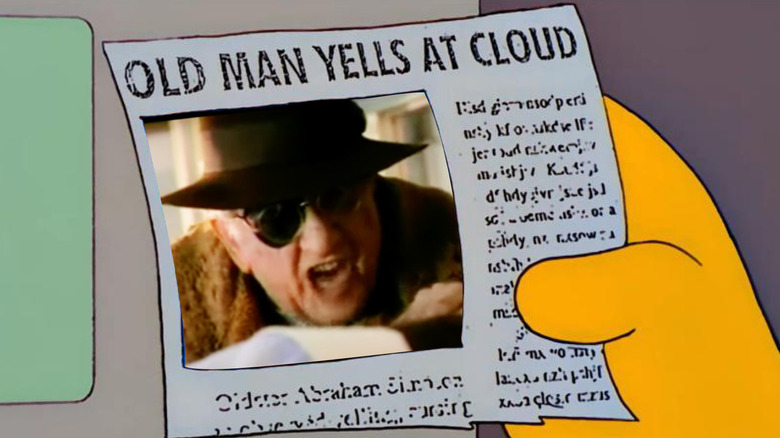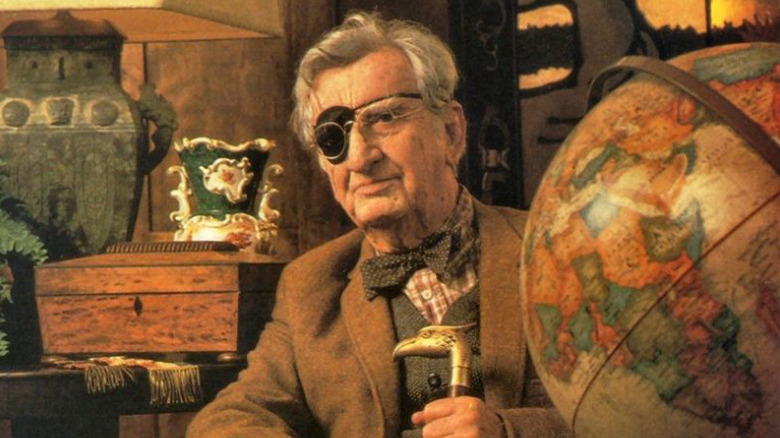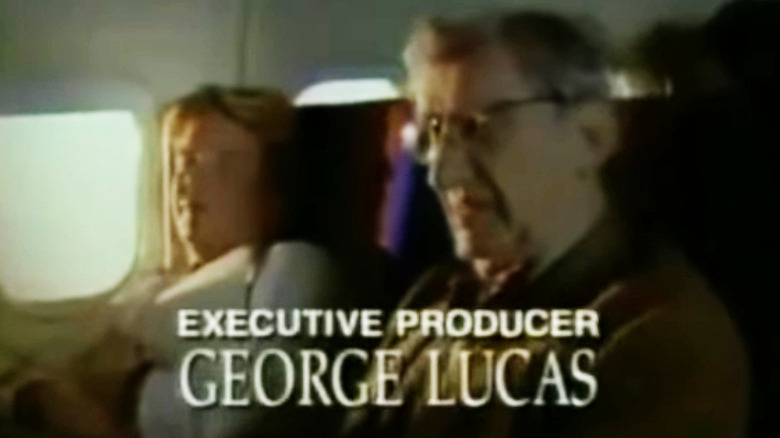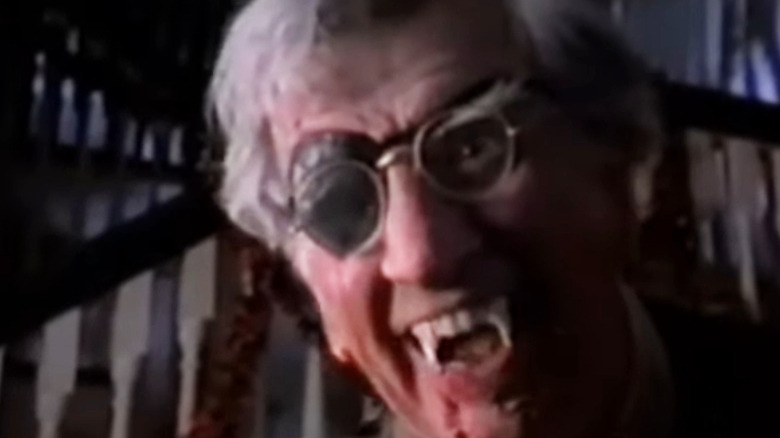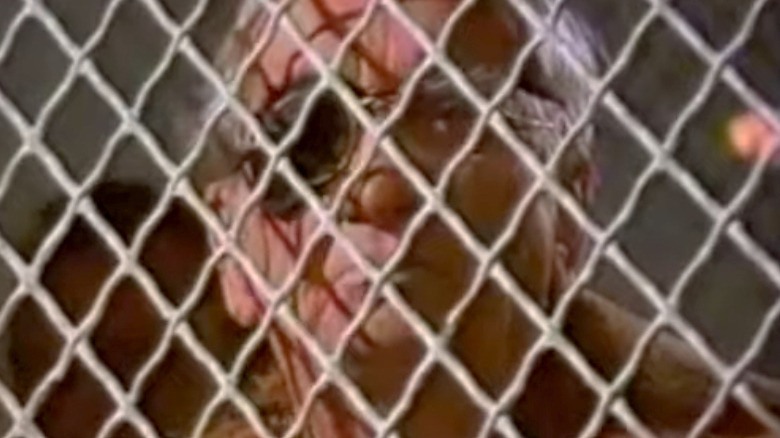Before Dial Of Destiny Rewrote Canon, Old Man Indiana Jones Was Grandpa Simpson
Pop quiz! How many actors have played Indiana Jones?
If you're clever, you might remember that Harrison Ford wasn't the only one, and that Oscar-nominated actor River Phoenix played the teenage version of the adventurous archaeologist in "Indiana Jones and the Last Crusade."
If you really know your stuff, you might remember that in "The Young Indiana Jones Chronicles" — later retitled "The Adventures of Young Indiana Jones" — he was played as a child by Corey Carrier ("My Blue Heaven"), and as a young adult by Sean Patrick Flanery ("The Boondock Saints").
But if you were watching that Emmy-winning TV series back in the 1990s, you just might remember that there's another Indiana Jones actor almost nobody ever talks about whose performance has been almost completely lost to time. Or at least, lost to editing, since they have been completely cut out of the DVD and streaming releases of the classic series.
The actor's name is George Hall. He played Indiana Jones 26 times. In live-action. And you haven't seen his performances because "The Young Indiana Jones Chronicles" treated him just like Grandpa Simpson: a 93-year-old man who nobody wanted to hang out with and who wouldn't stop telling long-winded stories that were impossible to believe. Sometimes he threatened to beat up children or donut shop clerks for no good reason.
We don't approve of erasing history, but we can perhaps understand why they eventually edited all these bizarre moments out of the show.
It was the style at the time
If you've never seen it, "The Young Indiana Jones Chronicles" ran for two seasons between 1992 and 1993. The show depicted Henry Jones Jr.'s adventures as a young boy, traveling the world with his studious father, and as a young man, fighting and working as a spy in World War I. The main gimmick of the series was that young Indiana Jones would run into famous historical figures, sometimes before they were even famous, like Sigmund Freud (Max Von Sydow), Winston Churchill (Julian Fellowes), and Norman Rockwell (Lukas Haas), as well as (deep breath) Teddy Roosevelt, Thomas Edison, Mata Hari, T.E. Lawrence, Leo Tolstoy, Dorothy Parker, Al Capone, Pablo Picasso, the list goes on. And on. And on.
But the makers of "The Young Indiana Jones Chronicles" apparently felt they needed a framing device to explain why these stories are being told, and so the episodes began in the then-present day, the early 1990s, where a nonagenarian Indiana Jones — wielding a cane and wearing an eyepatch — finds himself surrounded by young people who don't understand history and need to learn a thing or two. And so he interrupts their day with rambling oral histories of his adventures, which we know always take a whole hour (i.e., the duration of the episode) because the characters in the show have said so.
It would be one thing if "Old Man Indy" was treated with the dignity the character so richly deserves — he foiled Nazi plots on multiple occasions! But instead, these wraparound segments usually depict Indiana Jones as a hapless and/or ineffectual buffoon, and sometimes prone to weird outbursts of violence.
He used to be with it, but then they changed what it was
The first episode of the series begins with a couple of kids running off in the middle of a museum field trip. They run directly into Old Man Indy, who threatens to "clobber" them, forgets what he's talking about between sentences, and talks about his cat, who he's named "Henry," and it's at least a little unusual to name a cat after yourself and then complain that he's a "very demanding creature" who "makes my life hell sometimes."
But hey, the kids learn about the importance of archaeology. At least that framing device goes somewhere. They don't always. In another episode, Old Man Indy finds himself sitting next to a famous "Pirate of Wall Street" who looks and acts exactly like Donald Trump. Indiana Jones tries to tell him a story about the importance of empathy but at the end of the episode, we find out the Trump character slept through the entire story. If Old Man Indy had been a better storyteller, maybe the world would be in a very different place today.
Sometimes he's got an actual job to do, like give a lecture to The Pennsylvania History Society. When he's done, he finds out he was in the wrong room and just told The American Congress of Neurology a weird WWI anecdote instead. They all laugh at him. Roll credits!
Then of course there was the time Old Man Indy attended (checks notes) an "Annual Celebrity Tennis Shoe Auction and Dinner" (whatever that is) where he was seated next to two women arguing about the inherent cruelty of veal. Old Man Indy tells a story about the time he went on safari as a kid and then leaves the table, leaving everyone wondering what the point was. Three grown adults can't figure it out. Then the episode ends.
He can't bust heads like he used to, but he has his ways
Then of course there was the time Old Man Indy was at a donut shop where the surly teenager behind the counter said his job was hard. Admittedly he was being pretty rude to the customer in front of Indiana Jones, but that probably doesn't excuse the archaeologist from grabbing the kid's neck with his cane, slamming his face on the counter, tells him to apologize or he'll turn his head "into a sausage pizza," and proceeds to tell a long-winded story about how the kid doesn't know what a tough life is because he didn't fight in World War I.
That episode ends with Old Man Indy getting arrested for assault. The next episode begins with Indiana Jones thrown in jail for the offense, but he seems a little confused about where he is, and tells the other inmates they have to come up with an escape plan. Then he tells a story so long-winded that, by the end of it, his cellmates beg the guards to take Old Man Indy away.
Oh yes, and don't forget the Halloween episode, where Indiana Jones tries to frighten trick-or-treaters with a ghost costume, and when they aren't scared, tell a story that's supposed to make them believe in the supernatural. You'd think that would be a perfect time to trot out an anecdote about The Ark of the Covenant melting Nazis, but instead the story doesn't work, the kids aren't convinced, and he's forced to smear red stuff on his face and threaten to drink the kids' blood to get them off his property.
Pretty tough for a guy who almost got arrested for breaking into a mail box because he accidentally dropped his sandwich.
Dear Mr. President, there are too many states nowadays
You would think that these wild stories would get Old Man Indy into trouble, and besides getting himself thrown in jail (never mind how he got out), he does wind up going to a mental health professional. He's convinced that his daughter and grandson (never mind about them, all we know is they don't respect Indiana Jones's favorite soap opera and they won't listen to him when he asks them to stop playing loud rock music) are going to put him in an assisted-living facility, so he wants to get himself a clean bill of mental health.
When Old Man Indy tells the mental health professional that the last time he had psychiatric care it was with Sigmund Freud and Carl Jung, the word "delusions" gets written in his file. By the time he's done with the story the doctor is so charmed they rip up that slip of paper and throw it out.
Oh, we could go on. There was the time Indiana Jones got stuck in an emergency room for hours and taught a racist that racism was bad, resulting in the guy giving blood to an injured Black girl and saying to the nonagenarian, "I'm sorry I ever met you," to which Old Man Indy replies, "I have that effect on people." And then there was the time he got to yell "Yahoo!" while driving a monster truck.
You can find clips of Old Man Indy on YouTube, but not on the "Young Indiana Jones Chronicles"/"The Adventures of Young Indiana Jones" on DVD or Disney Plus. It's easy to see why they omitted his non-adventures from the canon, but it's still a bummer. George Lucas made a series that celebrates history, and in the process, participated in history's erasure.
